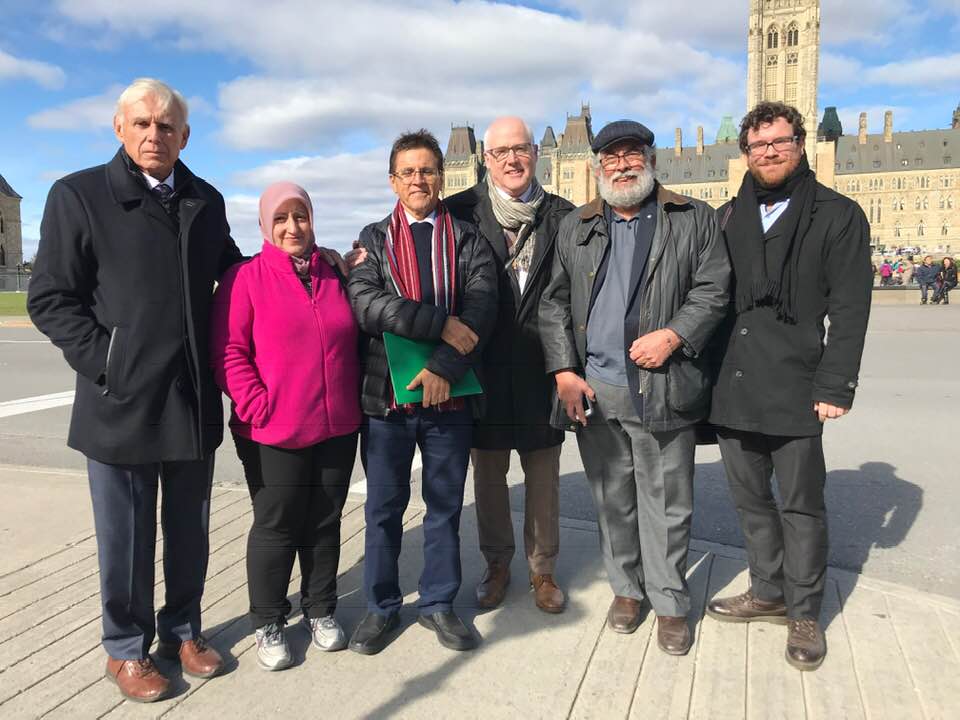
Hassan Diab (centre left) is joined outside parliament by (left to right) lawyer Don Bayne; Rania Tfaily, professor and spouse of Hassan Diab; Alex Neve, then Secretary General of Amnesty International Canada; Hassan Diab Support Committee member Roger Clark; and ICLMG national coordinator Tim McSorley. Credit: Alex Neve.
By Roger Clark
We tend to see the ‘War on Terror’ largely as a 21st-century phenomenon, inextricably linked to 9/11 and the consequent war in Afghanistan. However, I want to reflect on this in light of a deadly bombing outside a synagogue that took place in Paris some 20 years earlier. Following this attack, Hassan Diab became a convenient target and a timely personification of the terrorist threat, particularly as defined by the West. This resulted in the outrageous miscarriage of justice of which Hassan Diab remains the victim today. France decided to initiate a trial driven by political convenience in April 2023, and shockingly – despite evidence to the contrary – convicted Hassan Diab in absentia that month.
On August 4, 1978, the European Convention on the Suppression of Terrorism entered into force. Essentially, in so doing, the member countries of the Council of Europe strived to reinforce cooperation both internally – through national prevention policies – and internationally – by modifying existing extradition and mutual assistance arrangements. Specifically, member countries declared themselves:
Aware of the growing concern caused by the increase in acts of terrorism; wishing to take effective measures to ensure that the perpetrators of such acts do not escape prosecution and punishment; convinced that extradition is a particularly effective measure for achieving this result (emphasis added).
Unsurprisingly, Canada was already actively bringing its old and outdated extradition legislation into line with that of its European allies. The resulting Extradition Act came into force in June 1999. Its flaws and failings are now obvious to all, largely as a result of the experience of those who have been caught up in its ‘rubber-stamping’ mechanisms.
A bright light in this judicial darkness is the decision in September 2022 by the parliamentary Standing Committee on Justice and Human Rights to “undertake a comprehensive study on Extradition Law reform,” seeking recommendations on “how to overhaul thecurrent system.”[1] To coin a phrase, “if it’s broke, you’d better fix it.”
I see as no coincidence that the investigation into the deadly bombing of October 3, 1980, outside the synagogue on rue Copernic in Paris, was suddenly reactivated in 1999. It had lain dormant for almost twenty years. Unsourced and unverified secret intelligence mentioned the name ‘Hassan Diab’. Eight years went by before France requested Hassan’s arrest and extradition.
Now is neither the time nor place to analyze the five-year legal struggle which ended with Hassan Diab being put on a plane to Paris on November 14, 2014. He spent thirty-eight months in the Fleury-Mérogis prison, mostly in solitary confinement. The two anti-terrorist investigating judges in charge of the case concluded that there was no evidence to justify bringing Hassan to trial. He was unconditionally released and returned to Canada on January 15, 2018. Throughout all this, he was never charged and he was never tried. 15 years later, the nightmare continues with his conviction in France.
I’ll close with a brief quote from Justice Robert Maranger’s 2011 decision approving Hassan’s extradition: “…the case presented by the Republic of France against Mr. Diab is a weak case; the prospects of conviction in the context of a fair trial seem unlikely.”
That says it all.
I’d like to thank the ICLMG for its outstanding work over so many years. Tim and Xan continually earn our collective gratitude for building and growing this essential space where collaboration, partnerships and courage in the defence of human rights can thrive and become more effective.
More information & ways to take action at justiceforhassandiab.org & iclmg.ca/diab-letter
Roger Clark is the former director of Amnesty International (Canada), a longtime activist working for the promotion, protection, and observation of international human rights.
Footnote
[1] The study report has since been published: Randeep Sarai, Reforming Canada’s Extradition System: Report of the Standing Committee on Justice and Human Rights, Parliament of Canada, June 2023: https://www.ourcommons.ca/DocumentViewer/en/44-1/JUST/report-13/
Since you’re here…… we have a small favour to ask. Here at ICLMG, we are working very hard to protect and promote human rights and civil liberties in the context of the so-called “war on terror” in Canada. We do not receive any financial support from any federal, provincial or municipal governments or political parties. You can become our patron on Patreon and get rewards in exchange for your support. You can give as little as $1/month (that’s only $12/year!) and you can unsubscribe at any time. Any donations will go a long way to support our work. |


